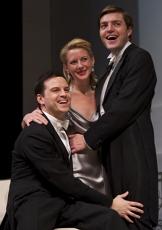Design for Living
It's the early 1930s, and Gilda lives with her lover Otto in a small artist's studio in Paris. Their friend Ernest fetches up and Gilda tells him that Otto is still in bed as he has suffered a bad night's sleep due to neuralgia. Ernest is suspicious, and rightly so, because Otto soon walks in through the front door. It's not long before we discover that Gilda spent the previous night with another friend Leo. When Otto's told about the previous night's events, he storms out leaving Gilda with Leo. And so begins a play where the principals spend years apart from each other, but never loose their mutual attraction.
Essentially, this play by Noel Coward, or 'The Master' as he came to be called, is a story of a ménage a trois between three creative types. Interior designer Gilda, artist Otto and playwright Leo all love each other, and not just in an affectionate sense. Written in 1932, it was obviously brave for its time, and indeed censorship prevented it from being performed on the London stage until 1939. It had its première on Broadway in 1933 where it was an instant hit. Set in the 30s and with central characters who are 'bright young things' the language is rather dated and somewhat irritating. The script is peppered with words such as 'beastly, frightfully, awfully' etc, and the word 'gay' is used to describe a wonderful time!
This revival of 'Design for Living' - a rather camouflaged title if ever there was one - is directed by Anthony Page. Coward once said that no-one loved his play as much as the three actors (Coward being one of them) who played the main roles in the original production. But I sense that Anthony Page might just be the exception, because the production does have something of a 'loving recreation', or at the very least a respectful recreation about it.
Andrew Scott as Leo, is all naughty schoolboy, playing tricks on callers on the 'phone, pulling faces and having tantrums. And his influence spills onto Tom Burke's Otto, who starts off rather sensible, if artistic, and then assumes the schoolboy air towards the end. Lisa Dillon's Gilda is an emotional jelly, wobbling and lurching along through life, largely discontented until she finds the light at the end of the tunnel. When their traits are combined, you can't help feeling that these three are extraordinarily selfish people who trample on other people's feelings with impunity. That's not the fault of the playing, rather it's the premise behind the concept and the script. However, I did find Andrew Scott's Leo, just a little too too, as a New Yorker friend says, ie a little less could have been more. The audience found it fun nonetheless.
Art dealer Ernest, a long-suffering friend of the three artistic lovers, is played by Angus Wright. Ernest is straight-talking, principled and respectable. In effect, he represents society at large which, at the time Coward was writing, was not exactly liberal in terms of its views on sexual preferences. So, at the end of the play, Ernest is almost deranged with anger. Now the motivation is clear, but I didn't feel convinced that Angus Wright's Ernest quite had that in him. But of course there's always the unexpected reaction to consider. In addition to the main characters, there's lovely work from Maggie McCarthy as the housekeeper, Mrs Hodge. Asked to take incoming telephone calls, she agrees with working-class trepidation, and also emphatically changes the way she addresses Gilda to 'Miss' once she realises that she's not married to Leo.
Les Brotherston's New York set won a round of applause from the audience. Though it is impressively glitzy, I didn't think it was quite so deserving, having seen more of the wow factor in other set designs recently. Still, it's all very professional and convincing, and a significant task considering the play changes locations three times.
Coward's story was a great idea and the plot still works pretty well, even if at least a third could be pruned without hurting it unduly. As one of the characters says, there's 'masses and masses and masses of words'. Spread over three acts, two intervals and 3 hours, it's something of an endurance test. In spite of that, it still manages to be very funny at times, and is certainly entertaining. And Anthony Page's stylish revival keeps faith with the original whilst adding some new dimensions in terms of characterisation. It's not exactly my cup of tea, but I suspect The Master might have approved.
"Last time Noel Coward's 1932 comedy was given a major revival, at the Donmar in 1994, it was presented as a raunchy, unashamed hymn to bisexuality and the delights of a menage a trois. But Anthony Page's infinitely subtler, and funnier, revival reminds us that Coward's cosmopolitan hedonism was always matched by an inbuilt puritanism, and that the play offers a genuine contest between the bohemian talentocracy and moral orthodoxy.."
Michael Billington for The Guardian
"A long and largely unrewarding slog."
Charles Spencer for The Daily Telegraph
"The first act is chewy and the second is interminable. The end is definitely worth seeing."
Quentin Letts for The Daily Mail
"Slick and stylish production ."
Julie Carpenter for The Daily Express
"Although the production could do with some neat cuts, it is full of intriguing subtleties and symmetries, cleverly accentuated. And the stellar acting makes Coward's comic lines seem piercingly precise."
Henry Hitchings for The Evening Standard
External links to full reviews from popular press
Guardian - Telegraph
Originally published on
